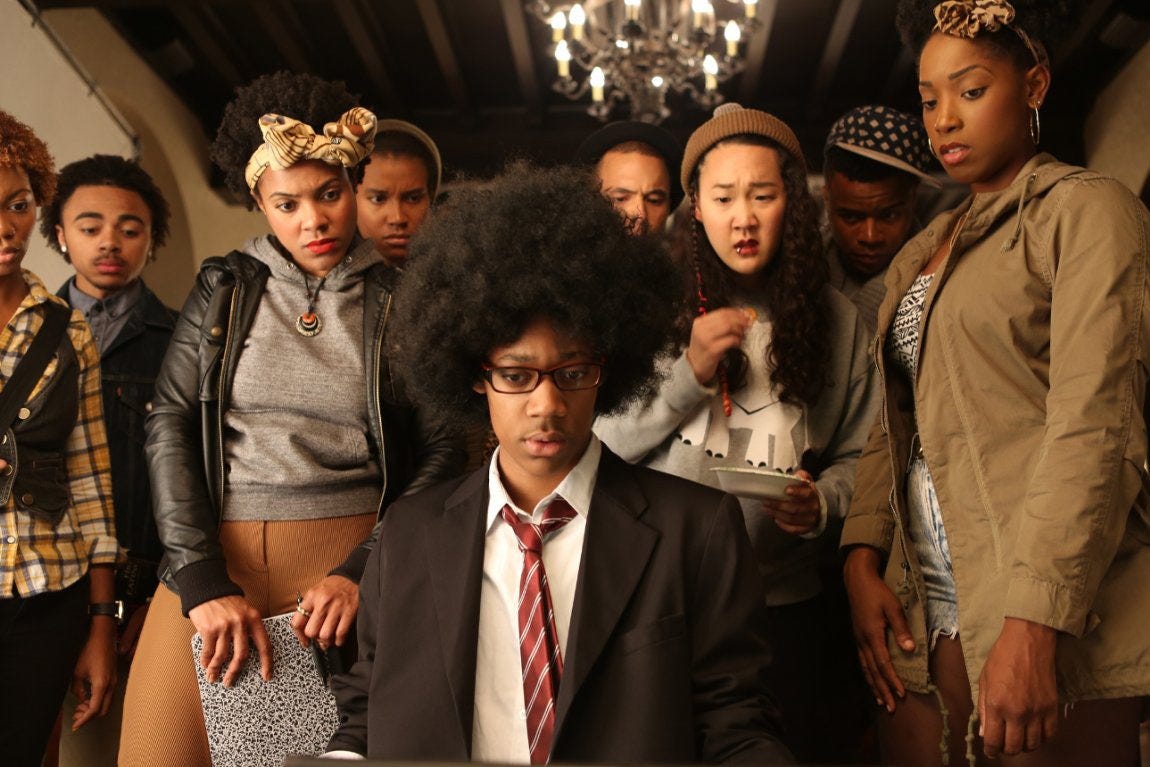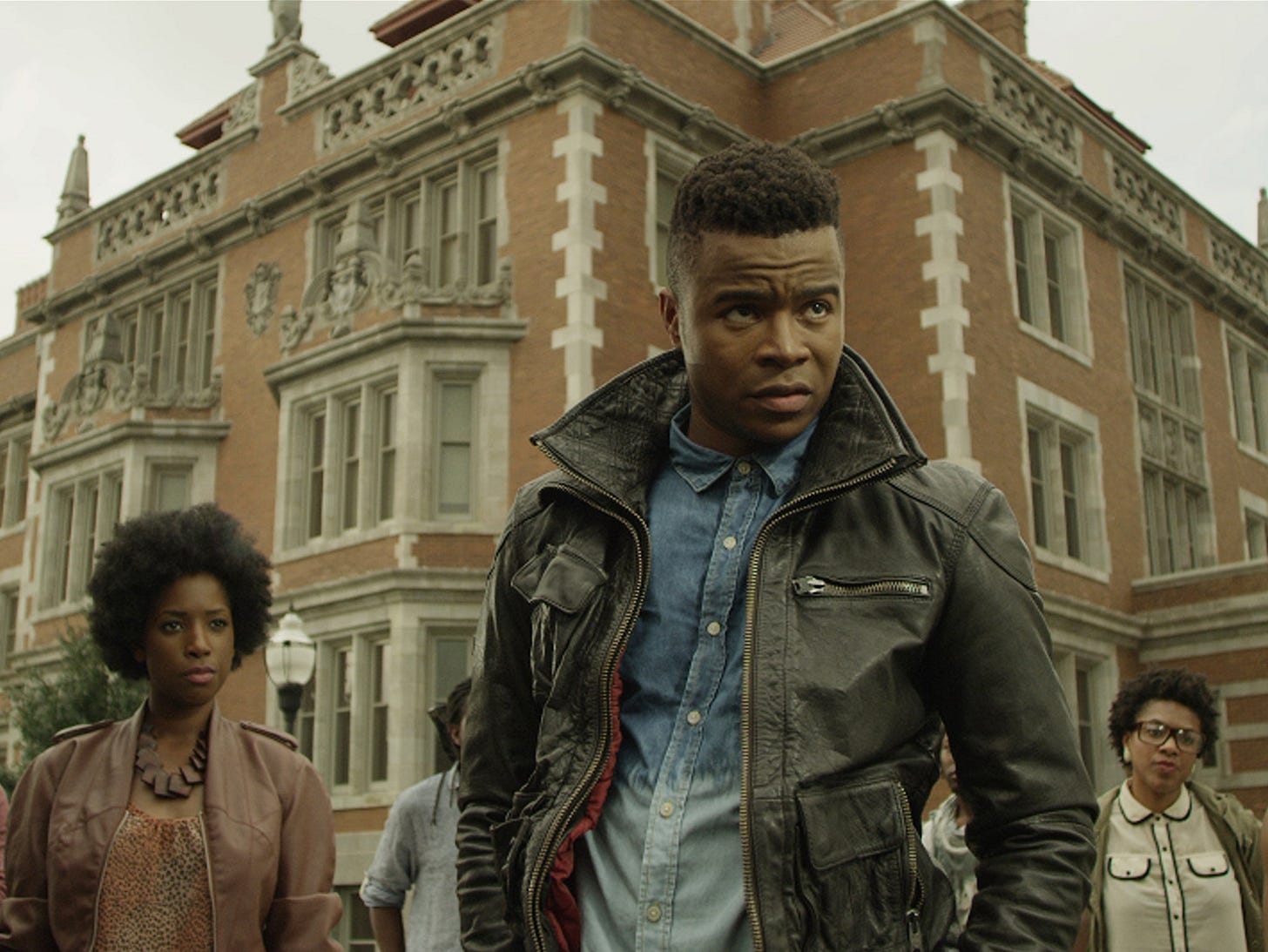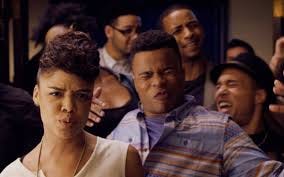Wow, we really were a different country when I went to prison, weren’t we? Justin Simien’s “Dear White People” was released at the end of 2014, the beginning of my prison term, and the sixth year of pretending a Black president meant we were so much more enlightened as a country than we’ve been historically. Today, the title alone would be the subject matter for hundreds of bro-power podcasts powered entirely by grievance. Oh dear internet, look what you’ve become! I blame Joe Rogan, who from my experience, perfectly encapsulates the Dumbest Drunk In Your Cellblock Who Is Always Inviting Loud Dudes To His Bunk.
This is primarily a college campus comedy, the likes of which we’ve seen before, though the warring factions have never entered in such a conflict with such jagged edges. The story largely centers on the gauntlet thrown down at Winchester University by Sam (the indelible Tessa Thompson). Sam wears the title of the Radically Woke Black Woman (hey, remember when “woke” wasn’t so hatefully sneered by white people?), hosting a radio show called “Dear White People” and challenging the white classmates at the prestigious school for their flippant disrespect and cultural obliviousness.
The white students, naturally, are aggrieved, even though they are the school’s majority demographic. Not willing to examine their own prejudices or privilege, the white students meet up with Sam in neutral areas like the cafeteria, fretting over their own culture obsolescence and scolding her for her confrontational tact. The outspoken Kyle Gallner (this creep again) gets the bulk of the material for the white characters, derisive when addressing the issue of Black strength, cagey when considering the misleading notion his time of cultural dominance is up.
But the movie largely swerves when it addresses that Sam’s words have had a chilled effect on the Black community. She fights for leadership of a Black dorm against blue blooded Troy (Brandon P. Bell), who seems overly groomed for a bright future. Guided by his pushy father (Dennis Haysbert), Troy seems like everyone has already boosted his signal as a young Obama, everybody other than Troy himself. Stuck in the middle of these debates are students like Lionel (Tyler James Williams), who doesn’t relate to any of these struggles, hiding away as a nerd who loves his sci-fi, coping with his possibly budding homosexual nature (and some distinct opinions on who is the best Star Trek captain). I knew a Lionel in prison, and it was so strange how he wasn’t Black enough for other Black guys, but too Black to thrive with the nerds.
Coco (Teyonnah Parris) has to deal with her own demons, confronting the issue of colorism when a visiting TV producer eschews her for Sam. She is not one of the main characters in the film, yet the movie affectionately observes her own journey towards acceptance and rejection at often the same time. Sam remains the focus (which makes sense given the heavenly Ms. Thompson) though as we get to know her, we see the contradictions: the code-switching, the white boyfriend that she keeps a secret. These identity clashes come to a head at a frat party where the students are asked to dress “Black”, fulfilling a host of cultural stereotypes, and leading to a more nuanced conversation about cultural appropriation that it seems America can no longer manage.
“Dear White People” doesn’t do much beyond set up these conflicts and let the characters explore themselves within each clash. It’s not a plot-heavy film, instead featuring scores of characters merely sitting and conversing, trading ideas and disagreements – credit to Simien for making these ideological brawls cinematic, and for enjoying these actors enough to spend enough time with them. The movie feels like it’s got the energy of a cartoon, which is interesting considering the density of topics bandied about. This isn’t designed to save us from a racially-fraught environment, it doesn’t have an easy diagnosis for these clashes, or for the white male rage manifesting in the wake of these confrontations. But it does have these ideologically-intriguing back-and-forths that showcase not only new ideas for a post-racial America, but the talent and charisma of a young, interesting cast. Parris has since graduated to the MCU in “The Marvels”, while Williams is a beloved regular on “Abbott Elementary”. There’s a spinoff show of this movie, and I have to catch it sometime. If you’ve seen it, I’d love to hear a review.
I feel as if we need to discuss death. The death penalty was not a tool for a couple of decades until President Donald Trump showed up to bring it back in his first term. At the close of his term, Donald Trump ordered the death of thirteen men in the final months before his delayed departure. Joe Biden pledged to end this practice, but has kept certain inmates on death row. As expected, Donald Trump (who is nothing if not literal minded) has talked about expanded use of the death penalty, and hopes to spend his next term killing everyone on death row. Donald Trump is a killer, and he wants to kill again.
Joe Biden will depart the presidency in January. But the men on death row are likely to be the first under another Trump presidency to find themselves killed by the state. As I’ve mentioned before, politicians need to be recognized when they make decisions that kill people, particularly the powerless. Joe Biden and the rest of Washington knows Trump isn’t bluffing about the death penalty, the use of which will expand given Trump’s policy interests. Biden can act now, commute sentences, provide clemency and pardons, just to make sure some men aren’t killed. If he doesn’t act on this, then he is basically pushing prisoners to their death and hoping to not be judged by it. We know Trump is murderous, and it’s certain Trump will clear up traffic on Death Row by ending lives. Joe Biden has a chance to save them, not for political capital, but to simply keep a man from being murdered. Does he have it in his character? Or will he step back as Donald Trump literally sanctions the murder of these men? As a human being, what would you do?
Join us next week for five days of Funny Ladies! 😁








I watched the TV show a few times, and initially expected to be amused by a scathing social satire of white people, and failed to connect with the show. That shouldn’t be seen as a criticism, and I don’t think it’s any kind of objective evaluation. I had a similar experience with HBO’s Girls. I assumed those shows were good, I watched a few episodes, and i couldn’t really figure out how i was supposed to react to either show. I should acknowledge that I’m okay with the idea that i just wasn’t the target audience. It’s also possible that both represented a new approach to storytelling that blends comedy and drama and satire in a way that I couldn’t understand.